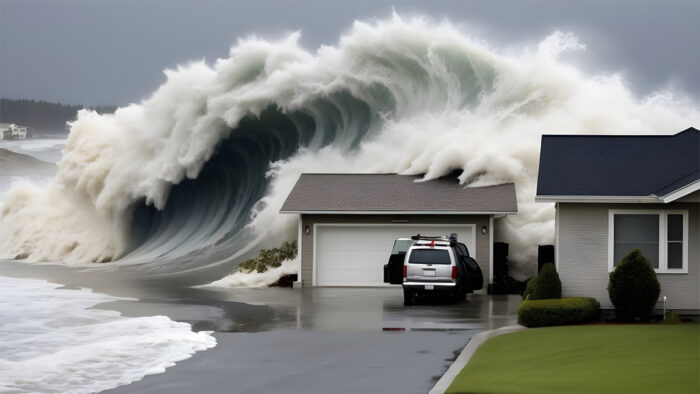Underwater volcanic eruptions or earthquakes usually cause great waves, can happen with slight warning, and have the power to reshape communities and coastlines within minutes. This event makes homeowners worried, and they find themselves asking: Does homeowners insurance cover tsunami damage?

Having home insurance is one thing; understanding the coverage it offers is another. This is why we will be uncovering the facts about home insurance and its bearing on damages caused by tsunamis.
What Type of Damage Is Caused by Tsunamis?
Tsunamis are undoubtedly destructive and powerful waves that are formed when a massive body of water is discharged as a result of volcanic activity and earthquakes. Apart from this, tsunami damage is widespread and differs.
Here are the types of damage that can be caused by these mighty waves:
- Debris buildup.
- Damage to homes.
- Electrical damage.
- Erosion and foundation damage.
Volcanic and earthquake activity that causes a tsunami can cause the following damage:
- Property damage.
The cost of the replacement and repair of damages caused by volcanic and earthquake activities resulting in tsunamis can be very expensive. However, if you are close to the epicenter or coast, the damage you will experience will be greater, and vice versa.
Does Homeowners Insurance Cover Tsunami Damage?
Standard homeowners insurance does not cover tsunami damage. The reason behind this exclusion is that tsunamis are seen as a form of flood damage, and flood damage is not part of the covered perils for most home insurance policies.
Additionally, insurance companies classify flood damage, including tsunamis, as high-risk and unpredictable when it comes to possible financial loss. Consequently, offering coverage for these risks will cause the premiums of policyholders to increase.
To handle this risk and provide protection for people living in these flood-prone areas, there are flood insurance policies that are available separately. In other words, you can purchase them as standalone quotes from any insurance company of your choice.
There are also policies provided through the National Flood Insurance Program (NFIP) in USA. With such policies, you do not have to worry about damages when you experience a flooding event, and tsunamis are no exception.
Does Flood Insurance Cover Tsunami Damage?
Now that you are aware that homeowners insurance may not offer coverage for tsunami damage, you may be wondering: Does flood insurance cover tsunami damage? Here is the answer.
The answer to this question is Yes and No. Do not worry, because I will explain why. First of all, flood insurance does not cover tsunami damage in the sense that it is not covered under a standard homeowners insurance policy.
In other words, a typical home insurance policy does not have flooding as a part of its covered peril. But if you would like to get a quote, you can purchase a separate policy.
Secondly, flood insurance covers tsunamis if you have a separate flood insurance policy, for instance, policies provided through the National Flood Insurance Program (NFIP) in the United States of America. Nevertheless, the specifics of the coverage differ, so check the details with your insurance provider.
Flood insurance offers two types of coverage, namely:
- Personal property damage.
- Dwelling coverage.
Does Earthquake Insurance Cover Tsunami Damage?
Earthquake insurance typically provides protection against damage caused by seismic activity. Even though tsunamis are usually caused by underwater earthquakes, leading to water damage, these damages are not covered by a standard earthquake insurance quote. However, since tsunamis are related to flooding, they will fall under the range of flood insurance.
Frequently Asked Questions
Can I lower the risk of tsunami damage to my home?
Yes, there are helpful measures you can exercise to reduce the risk or damage of a tsunami to your home:
- Maintain proper drainage.
- Elevating your home if you are in a tsunami zone.
- Installing flood barriers or valves.
- Ensure you have an emergency kit and an evacuation plan.
What should I do if a tsunami is coming?
If you are sure that a tsunami is about to hit, here are the immediate actions that you can take:
- Evacuate to higher ground if you are in a tsunami evacuation zone immediately.
- Follow and adhere to local emergency instructions and alerts.
- Stay away from waterways and coastlines.
- Preparing to sustain yourself and your family for at least 72 hours.
Having an understanding of the terms of your insurance coverage and preparing for natural disasters can significantly decrease the impact of tsunamis and other disastrous events. It is wise to get in touch with insurance professionals to help you customize your coverage to meet your needs.



